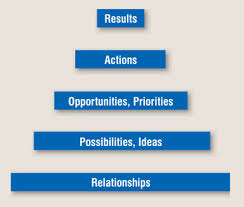
Feeling compelled to write, I’ve considered who is likely to read a blogpost during the English summer holiday. On the one hand, those school leaders who’ve completed a successful and rewarding year are probably abroad bathing in a pool of sangria or spritz, whilst those who feel that they’ve endured a torrid time will be at home with their tablets off, their phones on silent and their laptops reserved for watching escapist box sets from under the duvet.
However, there is another group of school leaders out there; the newly appointed ones! In remembering my beginning as a head teacher over seven years ago (I only had the two week Easter break to ponder my new role), I’m pretty sure that the latest residents soon to populate Head Teacherville are full of anticipation and open to receiving any support that they can get. So, in saluting your achievement and acknowledging your bravery, I thought I’d give you something to reflect on.
You’re probably giving some careful thought as to how you’d like your first day in September to go. This blogpost is going to focus on that first day and subsequent half term. In time, everything else will take care of itself IF you get the first steps right.
My first piece of advice is this: think about who you want to be and how you want to be when you meet your new team on Day 1. Give far less thought as to what you want to do. You are about to enter a world of immense discovery; discovery about your organisation, discovery about the role of head teacher, discovery about yourself!!! Who you are and how you come across will determine how successfully you start. Reflect on the fact that the message is never what you’ve said, it’s what’s been heard. This message can be given via your body language as much as anything you may say on day one.
If you’ve been analysing the latest school performance data and financial statistics in preparation for September, fine. Remember though, data only raises questions and this needs investigation before making some pronouncement as to what actions might need to be taken. Your first task is to establish relationships with as many people as possible. Look for your natural allies. These will almost certainly be people displaying certain behaviours rather than abilities at this early stage. No matter what the current level of attainment within your school, you will need a support team. Don’t be afraid to look beyond your existing leadership team for potential allies.
Note those people who are quieter or distant. These behaviours are not necessarily an indication of trouble ahead. Some like to take their time before visibly committing. However, notice them over time. Go out of your way to engage with them meaningfully. The quietly subversive can be a lot more difficult to work with than the person who’s not afraid to say what they think!
Steve Radcliffe (see reading links page) talks about the importance of relationships being strong enough at the base of your leadership pyramid (see below), and Andy Buck (see reading links also) talks about the importance of creating a “culture” and a “climate” as well as being “authentic”. This cannot be achieved on the first day or even in the first few weeks. Give yourself a chance.
On my first day, I only called the staff together for the first half an hour. Yes, I’d prepared a Powerpoint, but it was big picture stuff, very non-threatening, how we were going to be – who we were going to be as an organisation. I did not at any time refer to current performance or anything which could have been considered accusatory towards an individual with responsibility for particular standards. I also exposed enough of my personality in that first session. I acknowledged that it was only natural for them to want to “work me out” – so I gave them some help. In my case it meant sharing that “I don’t do untidy, either people or buildings, and I don’t do late. If you avoid these two, we’re likely to be fine!” This comment drew a visibly positive response. I had articulated that I wanted this new relationship to work – for the benefit of everyone and for the sake of the children. A baseline had been established. Crucially, I’d established a baseline against which I could also be measured. You don’t need to be a brilliantly talented employee to be tidy and on time! I was going to be studied as to what tidy and on time looked like as much as everyone else within the organisation.
Once day one is over, again your first few weeks are all about relationships with the staff and, most importantly, the children. If you get the relationships right with the children, most parents will accept your authority even if they don’t always agree with you; and they won’t!!! Again, look for some key potential allies amongst the parents. Their support can be more powerful than any newsletter which you’re going to write. But, remember Andy Buck’s advice about being authentic. You cannot be all things to all people all of the time.
Certain staff relationships need particular, careful attention. In the first few weeks, you’re going to be signing things that you don’t understand, particularly in relation to school business management. Don’t allow this to make you feel inadequate. Ask your SBM to explain things to you. Give them some 1:1 time.
Your relationship with the site manager is pivotal in making the life of everyone else within the school more positive. A good site manager is more than worth their weight in gold. A work to rule, ne’er do well who has more doctors’ appointments than Dot Cotton is an absolute nightmare for everyone. Take time early on to listen to their thoughts about the school; they’re not usually too shy to give an opinion!
With your SLT, offer reassurance that you’re looking to establish a really successful team with shared opportunity and collective responsibility. These people are your infantry. You need to give them reasons to fight for you; otherwise, look out for the bayonets!
Make sure that, apart from sitting comfortably to sign things which you have no idea about, you do not spend too much time in your office. Get out and about; stay out and about. If everyone is used to seeing you in the classrooms and corridors from day one, you’ll be viewed with far less suspicion. Offer genuine compliments to the staff you notice doing well. Offer encouragement to those who may need support. Crucially, remember that you are not there to fix everything by yourself. Read Steve Radcliffe’s book to look at how you can, “deliver through others”.
Look for a few “quick wins” that everyone benefits from. In my case, it involved getting a skip, well…quite a few skips to be truthful – it took over two years to tidy the school and its grounds up. Environment, both physical and emotional is key to school improvement…if I’m working there!!! There is a serious point here. It is that, even if you notice that something is not right – it takes time and the commitment of everyone to improve it. You cannot engage in some form of Blitzkrieg and expect to be thanked and appreciated for it. Andy Buck talks about the concept of “discretionary effort” in his book, Leadership Matters. I cannot emphasise enough the importance of taking time to develop this.
Hopefully, your Local Authority will provide you with a head teacher mentor. If they haven’t, ask for one. It isn’t healthy to remain permanently camped within your own walls. The job can very easily surround you and your relationship with a few key, supportive head teachers can be instrumental in helping you to become a more successful and happy leader – which in turn will benefit your own school community.
There’s lots more that I could add, but I wish to encourage you rather than overwhelm you. Feel free to contact me using the contact form on this site. My final piece of advice involves your best friend, AMOS. You didn’t know that I knew your best friend was called AMOS did you? Now, there’s a chance that you’re stepping up from deputy to head teacher in your existing school. For you, AMOS is not a problem. In fact, AMOS is probably most welcome. However, if you are moving to a new school, then AMOS is most certainly not welcome for at least the first half term, and even then only quietly within a leadership team meeting. If you mention your best friend, AMOS, too soon, you could be suffering the consequences for months. Because, just mentioning AMOS sends the message that your new school is not good enough, that the staff are not good enough, the children are not good enough and even the building’s not good enough!
Your relationship with AMOS must come to an end, for the time being at least. AMOS, dear leader is “At My Old School”. If there’s one piece of advice that I hope you accept, it is this. If you ever refer to AMOS, then apologise…quickly…and sincerely. It is only once your relationships are firmly and positively established that this old friend will ever be welcome within a conversation.
Enjoy the rest of your holiday. Why not read one of the suggested books on my reading & links page?
Wishing you good luck for day one and the year ahead.
Simon Jackson

